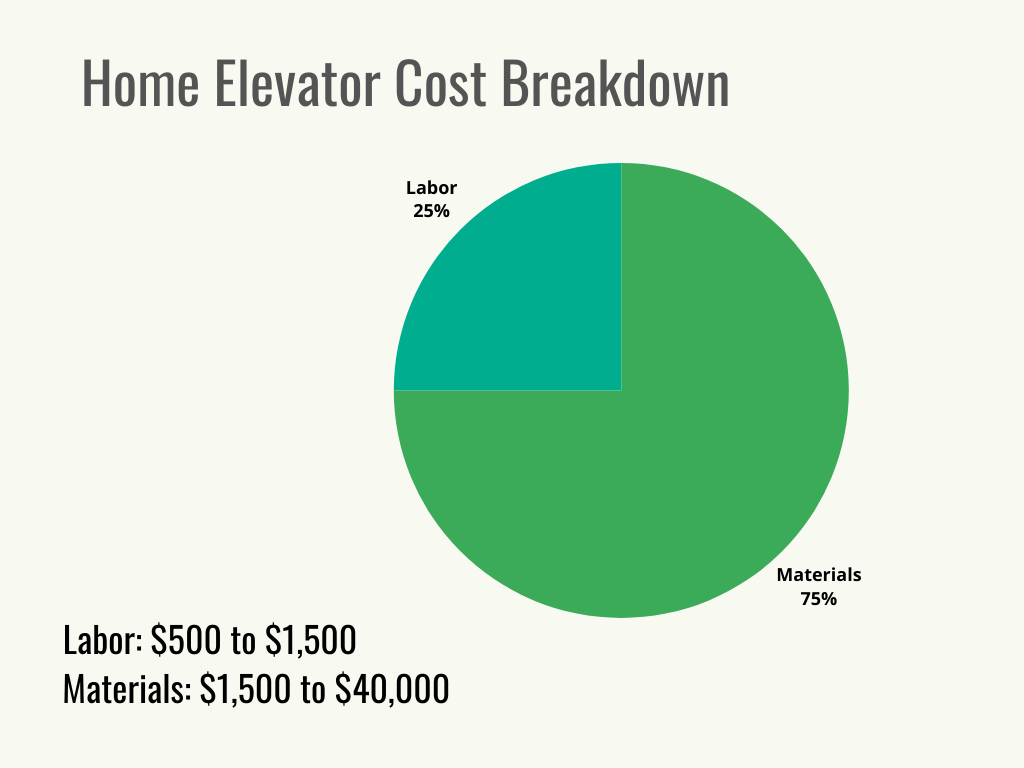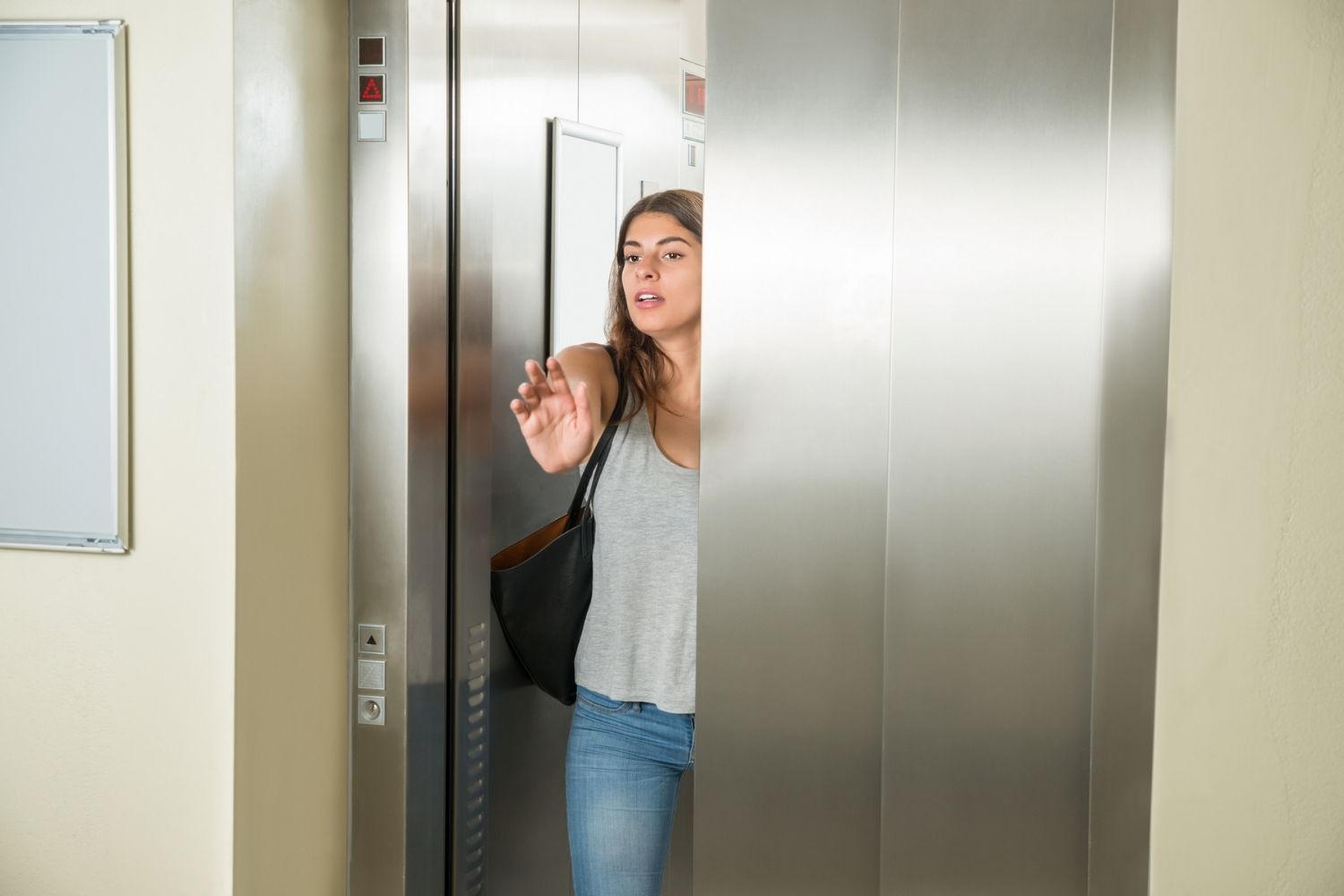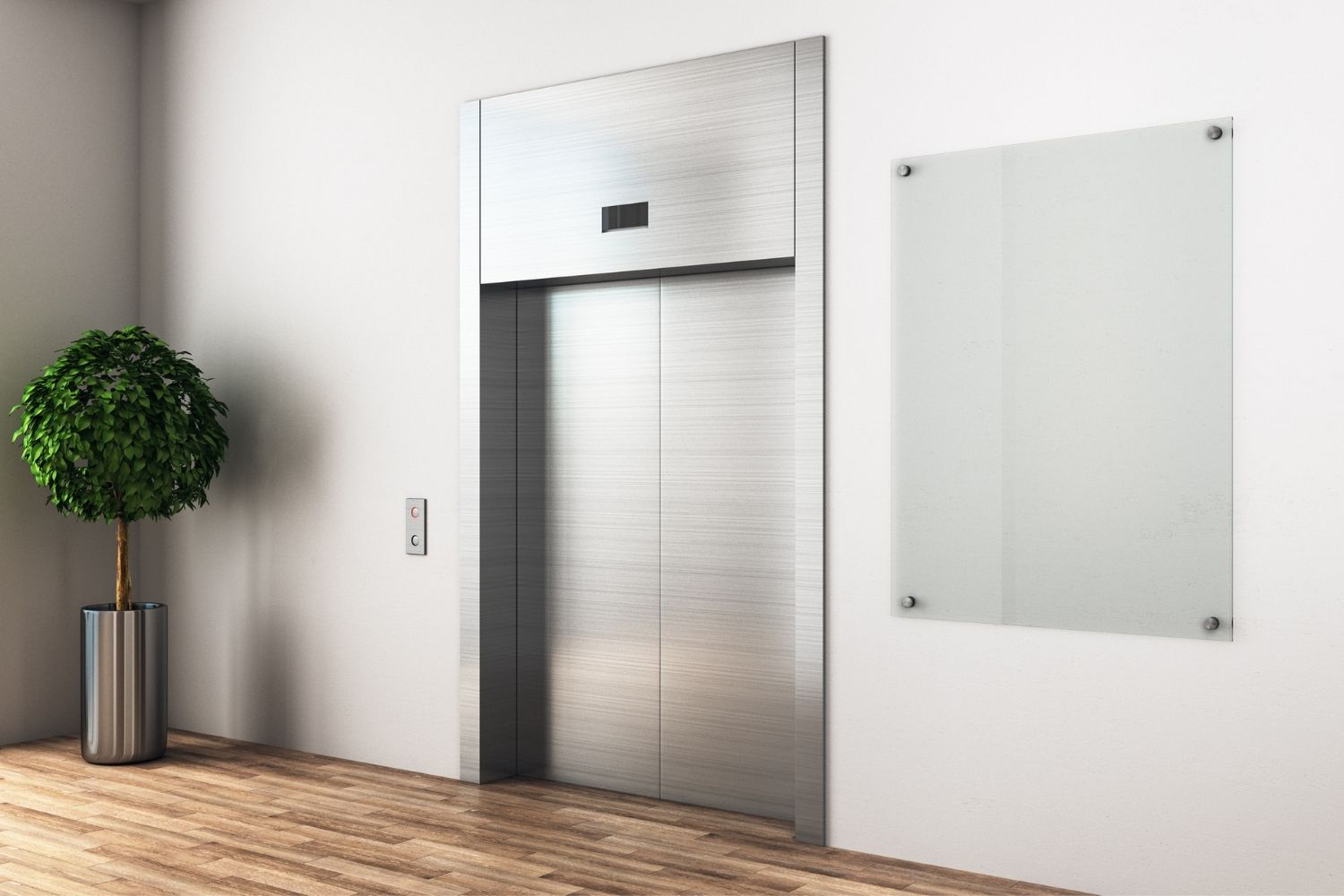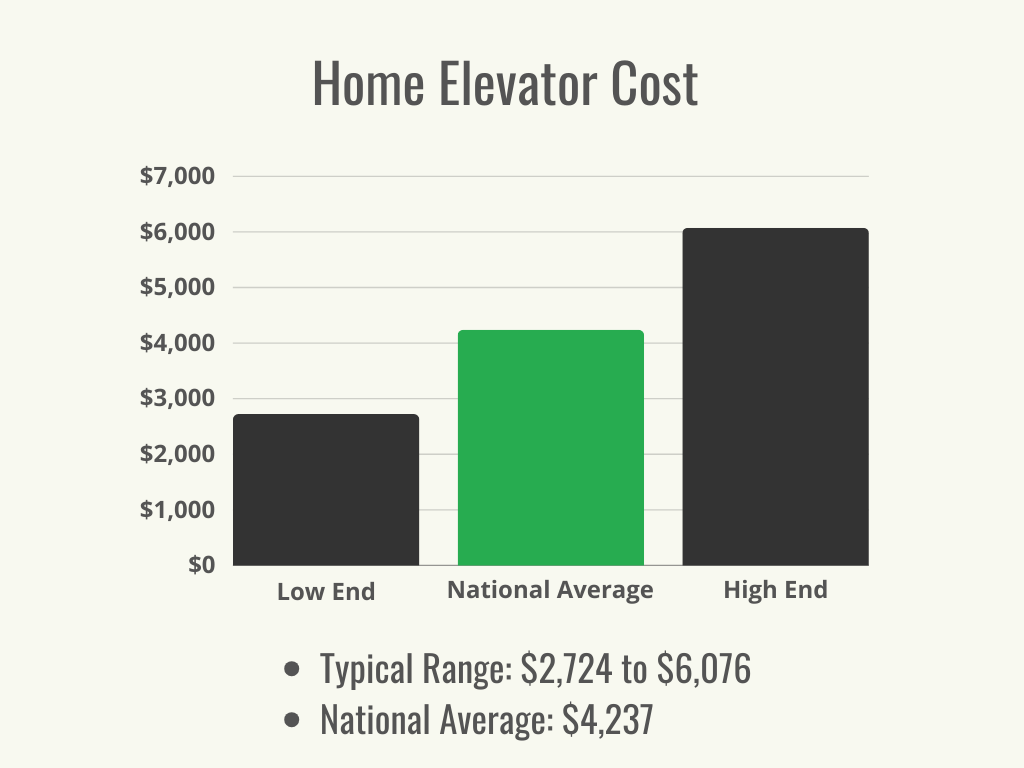We may earn revenue from the products available on this page and participate in affiliate programs. Learn More ›
Highlights
- The typical range for home elevator costs is $2,724 to $6,076 with a national average of $4,237.
- Cost factors for home elevator installation include equipment, labor, site preparation, number of floors, and elevator brand.
- Some of the benefits of installing a home elevator are increased home value, convenience, safety, space savings, style enhancement, and the ability for residents to age in place.
- Elevator installation is not a DIY project and will need to be completed by a qualified installer to be safe and up to code.
Kitchen and bathroom renovations are popular construction projects, but what about adding an elevator? Home elevators are usually added for luxury or necessity, but they can also boost home value or be a good design idea for aging in place. When added for necessity’s sake, an elevator can drastically improve the living conditions of people with limited mobility.
So how much does it cost to install an elevator in the home? According to Angi and HomeAdvisor, in-home elevator costs range from $2,724 to $6,076, but the average is $4,237. The number of floors the elevator will travel, the amount of construction required, and the elevator style will affect the total price. It’s worth noting that an elevator is not the same as a stair lift, which could be an option for some homeowners. Home elevators work well for multistory homes, for wheelchair users, and for carrying loads of groceries or equipment between levels.
Factors in Calculating Home Elevator Cost
Home elevators are a unique addition to a house, and they come with a significant range of prices and options. A 2-story small home elevator costs less than one for a 4-story house. The size of the elevator and the kind of motor will also influence the total price. Here are the top factors of home elevator prices.
Equipment
The type of drive shaft will determine the kind of equipment that will be installed. Extra mechanical rooms add cost, but most elevators also include some kind of battery backup system as well. Depending on the style of elevator, the equipment portion of the total price typically costs between $1,500 and $40,000.
Labor
Installing an elevator or lift will take a fair amount of labor to get it done properly—especially if it’s being added to an existing house. On average, labor rates run between $500 and $1,500. If the home elevator will require a shaft plus a mechanical room, labor will cost more than if it’s a simpler vertical lift or exterior elevator.

Site Preparation
Installing a residential elevator is easiest during a new home construction when installers don’t have to rip out existing structures or adjust mechanical systems to install the elevator. If the elevator is being installed in an existing house, the contractor will need to inspect the walls and floors to see what materials will be affected and how they can be refinished to keep the house insulated after the elevator is installed. Any floor that has elevator access will have some localized construction debris during installation. Overall, site preparation typically costs $500 to $15,000.
Number of Floors
Most residential elevators can be installed on up to four floors, but each floor comes at an additional cost. Homeowners can expect to pay between $5,000 and $15,000 for each additional floor. If the elevator is being installed for necessity’s sake, a homeowner could choose which floors it’s most critical for and opt to install it on fewer floors. Homes with only two stories automatically have a lower installation cost than those with additional stories.
Elevator Brand
The cost of home elevator installation can vary greatly depending on the brand of elevator that is chosen. Pneumatic has the highest average cost, while brands such as Easy Climber and Stiltz are at the lower end of the cost range. Homeowners will want to choose from the best home elevators based on their desired look and features while staying within their budget. The most popular brands are represented in the following home elevator price list.
| Elevator Brand | Average Cost (Materials and Labor) |
| Crystal | $30,000 to $40,000 |
| Easy Climber | $12,000 to $16,000 |
| Inclinator | $25,000 to $35,000 |
| Otis | $40,000 to $50,000 |
| Pneumatic | $35,000 to $60,000 |
| Savaria | $28,000 to $36,000 |
| Stiltz | $20,000 to $25,000 |
| Stratus | $32,000 to $40,000 |
Additional Costs and Considerations
Beyond the standard factors for home elevator costs, it may be necessary for homeowners to review additional price considerations. They don’t apply to every situation, but it will be clear right off the bat whether a retrofit or construction project will need to factor in the cost.
New Construction vs. Retrofit
Adding an elevator to an existing home can be a challenging project. During a retrofit, it will be necessary for a homeowner to hire an architect (and potentially a structural engineer), build and repair walls, install new ceiling, update the electrical panel and wiring, and add new carpentry framing. Each comes at its own cost, but it’s easier to estimate the cost for a new construction as opposed to a retrofit.
Using the services of an architect is the best way to make sure the elevator is placed in the most suitable location and has all the mechanical equipment space it needs. Depending on the complexity of the house, the lack of space, or the size of the elevator, it will cost between $2,000 and $9,300 to hire an architect for a retrofit. A structural engineer will cost $350 to $700 to hire.
Permits, Inspections, and Maintenance
All home elevators require inspections to ensure they operate safely. With a maintenance contract, a yearly inspection will be included to keep it up to date. Most areas require annual inspections, which cost at least $75. This project also typically requires a building permit, which can cost anywhere from $200 to $2,000.
Home Renovation and Repair
Adding an elevator during a home renovation is an excellent way to save on some costs since the cost of an architect or electrician is spread across multiple projects. Depending on the extent of the renovation, the contractor may have more flexibility to install a larger elevator or place it in the best spot more easily. Once the elevator is installed, it will cost $75 to $100 per hour for maintenance and repair plus any equipment costs. Some contractors may offer an annual maintenance contract for $200 to $350.
Gate and Door Installation
When installing a home elevator for seniors, older adults, or those with limited mobility, a code-compliant safety gate will also need to be installed. Most elevators come with some kind of safety gate, but homeowners will want to make sure it works for their needs. Additionally, the exterior elevator doors can be customized to match the rest of the house. It’s a good way to increase the home’s value even more and ensure the elevator doesn’t stick out like an afterthought addition. However, decorative doors can add as much as $25,000 to the project cost.
Customizations
For additional costs, it is possible to opt for special lighting, paneling, and other extra features to be included. Some homeowners even opt to add a phone or even music and speakers to the elevator. An elevator contractor can accurately quote each customized option.

Home Elevator Cost by Type of Elevator
Since the type of elevator is a primary factor in the total cost, homeowners will want to consider each type and its associated costs. This will make it easier to understand the style options and how they fit in the budget.
| Elevator Type | Average Cost (Materials and Labor) |
| Cable-driven | $15,000 to $35,000 |
| Chain-driven | $27,000 to $62,000 |
| Geared traction | $25,000 to $38,000 |
| Gearless traction | $29,000 to $55,000 |
| Hydraulic | $25,000 to $50,000 |
| Outdoor | $2,000 to $10,000 |
| Pneumatic | $35,000 to $60,000 |
| Shaftless | $15,000 to $25,000 |
| Vertical platform | $5,000 to $20,000 |
Cable-Driven
A cable-driven elevator is similar to the style used in larger office buildings, condos, or other commercial properties. The cable winds around a drum and raises or lowers the elevator. The drum and counterweight require extra space in a mechanical room, but they’re often used to retrofit homes. The cable needs to be inspected often since regular use can wear it out quickly. This style costs $15,000 to $35,000 on average. While there are pros and cons of buying a condo, one of the benefits is that there will likely already be an elevator installed.
Chain-Driven
For another option that doesn’t require a machine room, opt for the chain-driven elevator with a counterweight attached to the chain that moves in the opposite direction of the elevator. The shaft will be larger to accommodate the counterweight, but the chain is stronger than a cable. The downside is that this is one of the louder styles, which may not be conducive to a residence. This style costs $27,000 to $62,000 on average.
Geared Traction
Geared traction elevators have a gearbox on the top of the elevator that uses a pulley system to operate the elevator. This style costs $25,000 to $38,000, but it operates slower and can only travel up to 250 feet.
Gearless Traction
This is another excellent option for a retrofit project. Gearless traction elevators don’t require an extra machine room since the pulleys work on a track inside the shaft with the counterweight. The only extra space needed is at the top of the shaft. This style costs an average of $29,000 to $55,000.
Hydraulic
Hydraulic elevators need a smaller footprint since they work on a large piston below the elevator to raise and lower it using a hydraulic lift. No extra mechanical room is needed, and they operate more quietly than those with a cable or chain. It’s a good idea to talk with the elevator company to determine if the home will need a pit to hold the piston or if it can be built without it. Expect to pay $25,000 to $50,000 for a hydraulic elevator.
Outdoor
In some cases, a house just may not be able to retrofit an elevator, or it needs to be added on a tight budget. Fortunately, an outdoor elevator is a great solution. It’s built on the exterior with materials designed to withstand the elements and temperatures. Homeowners can access the elevator from the inside in whichever room or hallway it’s built against. This style can be built for an average cost of $2,000 to $10,000.
Pneumatic
A pneumatic elevator works using a pressurized vacuum system to push the elevator up and down. These elevators can’t be hidden behind walls and are often made of glass, but they’re still relatively simple to add to a house. No pits or mechanical rooms are needed, either. For this modern elevator, expect to pay $35,000 to $60,000.
Shaftless
Another simple elevator is the shaftless design that can work for 2-story houses. This type is smaller than others, so only one person can use it at a time, but it requires less space to be used during a retrofit. All the materials used will be more basic and plain than those used for larger elevators. A shaftless home elevator costs $15,000 to $25,000 on average.
Vertical Platform
A vertical lift can make a great wheelchair elevator for homes that are split-level. It works by moving the platform up, similar to how a forklift raises the forks. Vertical platform lifts are great for moving wheelchairs between floors. This style doesn’t need a full shaft or much space to operate, making it a less expensive option. The average cost of this elevator type is $5,000 to $20,000.

Benefits of Installing a Home Elevator
Usually, people associate installing an elevator for home use with one of two reasons: mobility challenges or the desire to have a luxury feature. They’re both quite valid reasons. However, homeowners could also consider adding an elevator to a multistory house for general convenience and to increase the home value.
Increased Home Value
Home elevator costs come at a price, but having a home elevator does offer an increase in home value. Prospective home buyers may find them highly appealing during the buying process, too. Homeowners can ask an appraiser to assess whether an elevator can boost their property value as they look at renovating their homes. For typical elevators built inside and mostly concealed, it’s possible to see a 10 percent to 25 percent increase in home value, or a 50 percent return on investment.
Convenience
Every home has its unique characteristics. One of those may be multiple floors accessed frequently throughout the day, or perhaps the garage is on a lower floor but the entry and kitchen are much higher. Between hauling decor and boxes that are frequently used, taking cleaning equipment to each floor more easily, and avoiding carrying groceries up multiple flights, an elevator can make traveling between the floors of a home much less of a hassle.
Safety
Installing an elevator is a great way to make a home more accessible. Many people may find they prefer an elevator so they can move between levels safely and more easily. Limited mobility or medical issues can create safety concerns for people who are less steady on stairs. Using an elevator helps people move between floors more safely and gives them peace of mind about getting where they need to go.
Space Savings
Ironically, an elevator takes up less space than installing a chair lift on a standard stairwell. That means it is possible to gain back some extra space by choosing to install an elevator instead of adding a chair lift or other mobility platform. Similarly, adding the elevator to the exterior could keep the interior space free as well.
Style Enhancement
Adding an elevator that reflects a homeowner’s personal style is a great way to enhance a home’s interior. It can also boost the appearance of a home—and the functionality—uniquely and stylishly. Styles can be chosen to match a more modern appearance or a cozy vintage design.
Aging in Place
As homeowners age, it’s hard to consider leaving a home where many wonderful memories were made, especially if they built the home themselves. If mobility issues are the only reason to consider leaving the family home, then adding an elevator can help solve the challenge and allow homeowners a chance to age in place and live out their days in a place that’s comfortable and familiar. With all the hidden costs of moving, making a few upgrades to improve a home’s accessibility may even be the more affordable option.
Home Elevator Installation: DIY vs. Hiring a Professional
It’s not recommended for a homeowner to attempt a home elevator DIY project. While it could be easy for some people to knock out a wall and add a closet, that’s not quite the same as building an elevator shaft—much less an elevator. Elevators are complicated machines that should be installed by a licensed pro, and local laws may even require it. Experienced elevator contractors will be familiar with each type of elevator so they can help homeowners make an informed decision that’s best for their needs and house. Numerous safety and accessibility codes need to be followed to ensure the elevator works for any mobility challenges. Letting a qualified professional install this technical equipment means not having to be concerned about whether it’s safe to use.

How to Save Money on Home Elevator Cost
A home elevator installation has a higher price point than many home projects, so homeowners may be wondering how to save on costs. Here are a few ways to reduce the total price of a home elevator.
- Shop around. Homeowners will want to ask for quotes from several companies and make sure they do an in-home consultation to make sure each company is working from the same information. They’ll also want to price shop their elevator of choice using the exact specifications to find the best price or a better warranty.
- Avoid retrofitting if possible. Adding an elevator while building the home will save money in the long term if a homeowner thinks it will come in handy later.
- Make an informed decision. Homeowners will need to decide exactly what purpose the elevator will serve so a pro can help them decide which type is best.
- Opt for an outdoor elevator. Homeowners may want to consider adding a lower-cost outdoor elevator if it works with the existing house configuration.
- Choose the drive wisely. Homeowners can save by choosing a less expensive drive if it works in the space.
- Stick to your original selection. If a homeowner changes their mind after ordering the elevator and construction has already begun, they will have a much higher final cost.
- Keep it generic. Homeowners will want to consider an elevator without proprietary parts that may cost more to replace if they wear out.
- Consider compromising on materials. Homeowners can save money by avoiding customizations or adding expensive materials for a more stylish appearance.
- Try partial DIY. Homeowners can ask their elevator installation professional if there are any demolition or site preparation tasks they can do on their own to save on labor costs.
It’s not uncommon for a homeowner to seek financing to add an elevator since it can quickly become a pricey addition. Some homeowners choose to pay with a credit card if it has 0 percent financing.
Another option is to shop around for a home improvement loan or a home equity loan from one of the best home equity lenders (such as U.S. Bank or Flagstar). The elevator company may also offer financing.
Additionally, homeowners can check with local or state authorities to see if there are accessibility grants they could qualify for when adding a home elevator. Some residential elevators could be eligible for a tax deduction, but an accountant will have the best information for an individual situation.
Questions to Ask About Home Elevator Installation
One of the keys to a successful construction project is asking plenty of questions before hiring a contractor. It’s the best way for a homeowner to avoid miscommunication and ensure that the contractor is qualified.Here are some questions homeowners can ask about residential elevator costs.
- Are you licensed, bonded, and insured?
- Can you provide me with a list of references?
- Do I need to obtain a building permit?
- What drive system is best for the space I have available and for the needs I have?
- Are there options that are less expensive and still work to meet my needs?
- How can I customize this elevator to match my house and style?
- Can I review a line-item quote or contract first?
- Does the elevator you recommend have a lot of proprietary parts?
- What kind of safety features does the elevator come with?
- Who will do the actual installation of the shaft and elevator?
- Do you subcontract any construction tasks? If so, who oversees the work?
- What kind of electrical requirements will this elevator need?
- How much of my house will be inaccessible during the retrofit?
- How long will it take to install?
- What kind of maintenance will this elevator need?
- Do I have to have regular inspections? If so, how much does that cost?
- What happens if it breaks while I’m using it?
- Who is my main point of contact if I have questions?
- Do you offer any warranties?
FAQs
Elevators are complex machines that offer many benefits to homeowners who choose to add one to their house. Determining the total price can be tricky since there are so many variables like size, drive, style, and more. Homeowners will want to do their research, including reviewing the answers to the most commonly asked questions, to help begin the decision-making process.
Q. Should I install an elevator or a chair lift?
Home elevators and chair lifts are both great ways to improve home safety for older adults. A home elevator is designed to carry at least one or two people, people in wheelchairs, or a person and their belongings from one level to the next.
Home elevators work in at least 2-story houses where the homeowner wants to add an easier method of carrying things between floors or when assistance is needed to get to another level. The average cost of a home elevator is $4,237.
Alternatively, chair lifts work well for homes that don’t have the right space to install an elevator. They’re also easy to install, which makes them a less expensive option in some cases. Chair lift costs start at $2,000 on average.
Q. How long will my home elevator last?
An elevator that is properly maintained can last for decades. Some parts like the hoists may last much longer, while doors typically wear out the fastest, especially if they’re not maintained properly. Cables typically need to be replaced every 5 years.
Q. How long does it take to install an elevator in a house?
It usually takes 2 to 4 weeks to install an elevator in a house. Simple lift elevators could be installed in a few days.
Sources: Angi, HomeAdvisor

